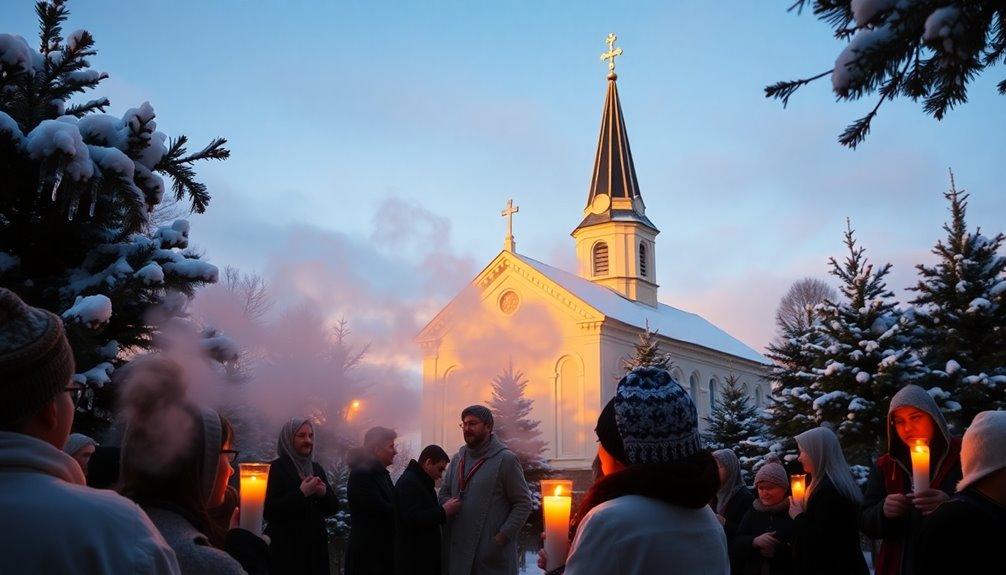Orthodox Christians celebrate Christmas on January 7, following the Julian calendar, which is 13 days behind the Gregorian calendar used by most Western Christians. This tradition includes a 40-day fasting period leading up to Christmas, and families gather for a festive meal featuring 12 symbolic dishes. Kutia, a sweet dish made from wheat, honey, and poppy seeds, represents family unity. Each region showcases unique customs, from puppet shows in Ukraine to traditional practices in Greece. Celebrating on January 7 allows Orthodox Christians to preserve their rich heritage and spiritual legacy, and if you explore further, you'll uncover more fascinating traditions.
Key Takeaways
- Orthodox Christians celebrate Christmas on January 7 due to their adherence to the Julian calendar, which is 13 days behind the Gregorian calendar.
- The celebration follows a 40-day fasting period, emphasizing spiritual preparation and reflection leading up to Christmas Day.
- Traditional customs include a festive Christmas Eve meal with twelve dishes, symbolizing Christ's apostles, highlighting family unity through special foods like kutia.
- Regional variations exist, such as the Ukrainian "vertep" puppet show and Greece's Epiphany river-jumping ceremony, showcasing diverse Orthodox traditions.
- Contemporary issues, like Ukraine's shift to December 25 for national identity, challenge the preservation of traditional Orthodox Christmas observances.
Calendar Differences Explained
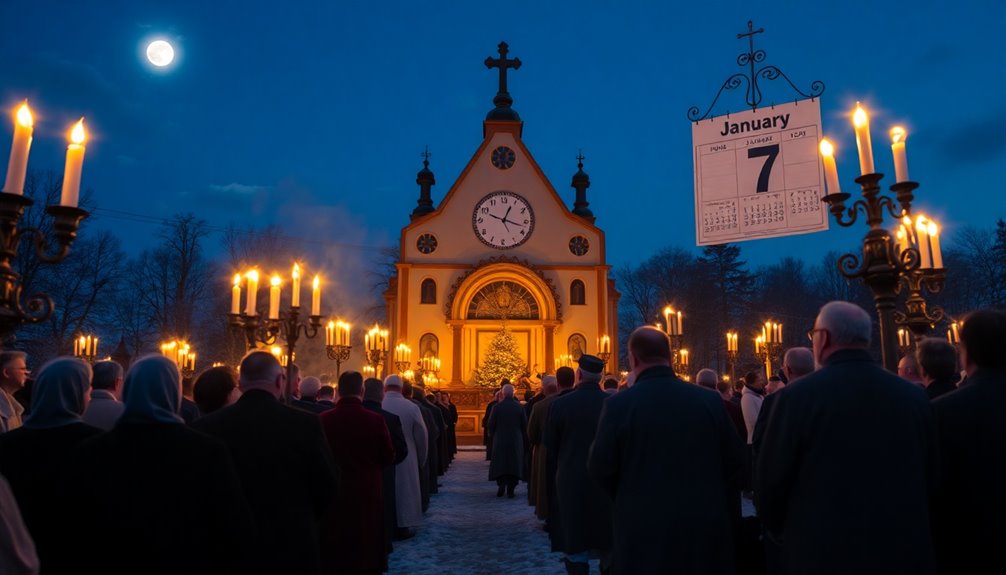
When you look at the dates Orthodox Christians celebrate Christmas, you'll notice they observe it on January 7 instead of December 25. This difference comes from the calendars they use.
Orthodox Christians follow the Julian calendar, which is currently 13 days behind the Gregorian calendar adopted by Western Christians. Established by Julius Caesar in 46 BC, the Julian calendar faced inaccuracies that Pope Gregory XIII corrected in 1582.
This calendar gap has led to distinct Christmas traditions and reflects the historical schism between Eastern and Western Christianity.
Curiously, some Orthodox communities, like the Ukrainian Greek Catholic Church, are moving to the Gregorian calendar, now celebrating Christmas on December 25, showing how traditions can evolve.
Overview of Traditional Celebrations
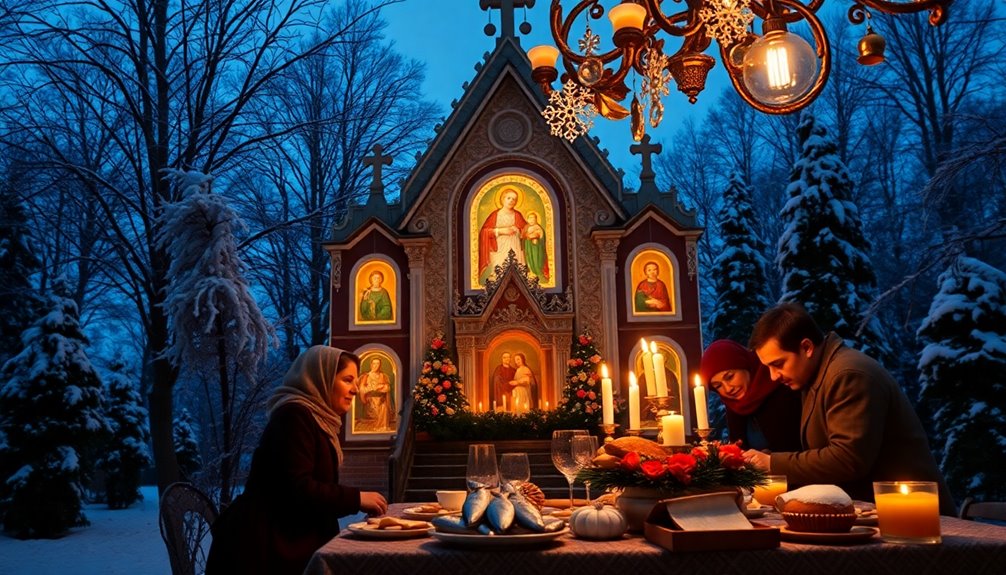
Orthodox Christmas celebrations are rich in tradition and deeply rooted in spiritual significance. Orthodox Christians celebrate Christmas on January 7, following a 40-day fasting period that leads up to the festivities.
On Christmas Eve, families gather for a meal featuring twelve traditional dishes, symbolizing Christ's apostles. A highlight of this meal is Kutia, made from wheat, honey, and poppy seeds, representing family unity and blessings for a good harvest.
As midnight approaches, many attend a midnight mass, honoring the Nativity and fostering a sense of community. Throughout the holiday, you'll hear greetings like "Christ is born!" with the response "Glory to Him!"
This exchange reflects the deep spiritual significance of the season, enriching the Orthodox Christmas experience.
Unique Foods and Customs
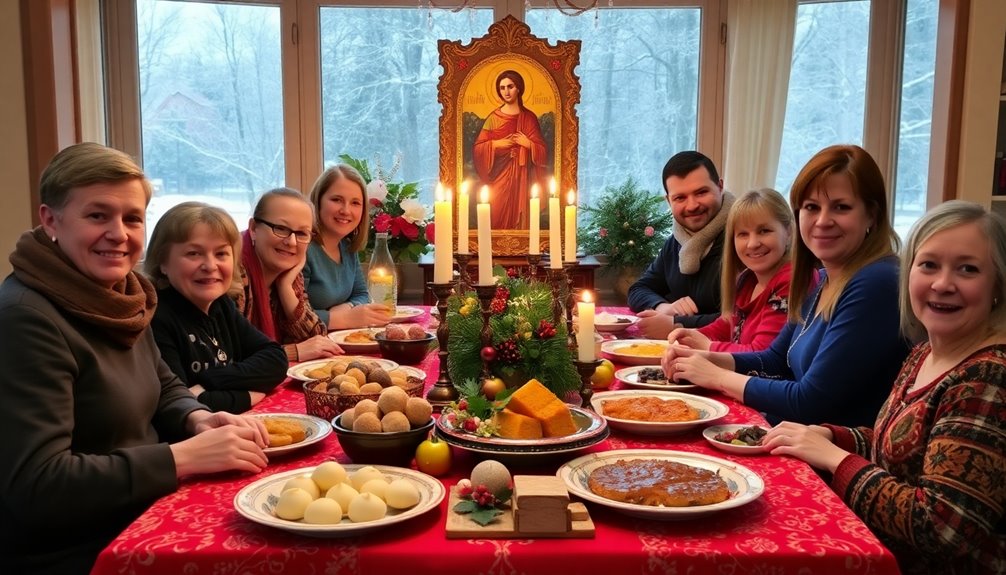
The Christmas Eve meal in Orthodox traditions is a vibrant tapestry of flavors and customs, showcasing a variety of dishes that hold deep meaning. This twelve-dish meal symbolizes the twelve apostles and often includes Kutia, made from wheat, honey, and poppy seeds, representing family unity and good harvests.
After a strict fasting period, you can enjoy unique foods and traditional drinks that make the celebration special.
Here are some common elements of the feast:
- Kutia
- Roast suckling pig or goose
- Traditional drinks
- The vertep puppet show
These customs enrich your Orthodox Christmas experience, connecting you to your heritage and the spirit of the holiday.
Regional Variations in Practices
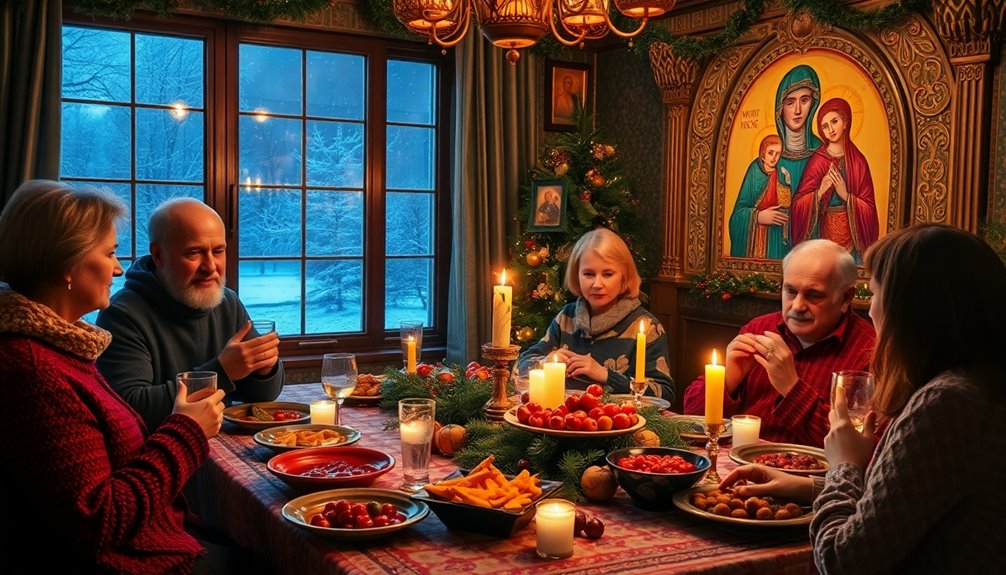
Across different regions, Christmas practices reflect the rich diversity within Orthodox traditions, showcasing local customs and spiritual significance.
In Greece, you might witness the exhilarating Epiphany celebration, where people jump into freezing rivers to retrieve a wooden cross, symbolizing blessings for the year ahead through communal celebrations.
Ukrainian families enjoy "vertep," a nativity puppet show that captivates children and embodies festive spirit.
Meanwhile, Serbian Orthodox Christians celebrate the Badnjak ceremony on Christmas Eve, bringing home an oak branch to symbolize Christ's warmth.
Food customs vary too; Russian Orthodox communities serve kutya, while Ethiopian Orthodox Christians savor wat, a flavorful stew representing the twelve apostles.
These regional variations highlight the unique ways people honor their Orthodox Christmas traditions.
The Significance of January 7
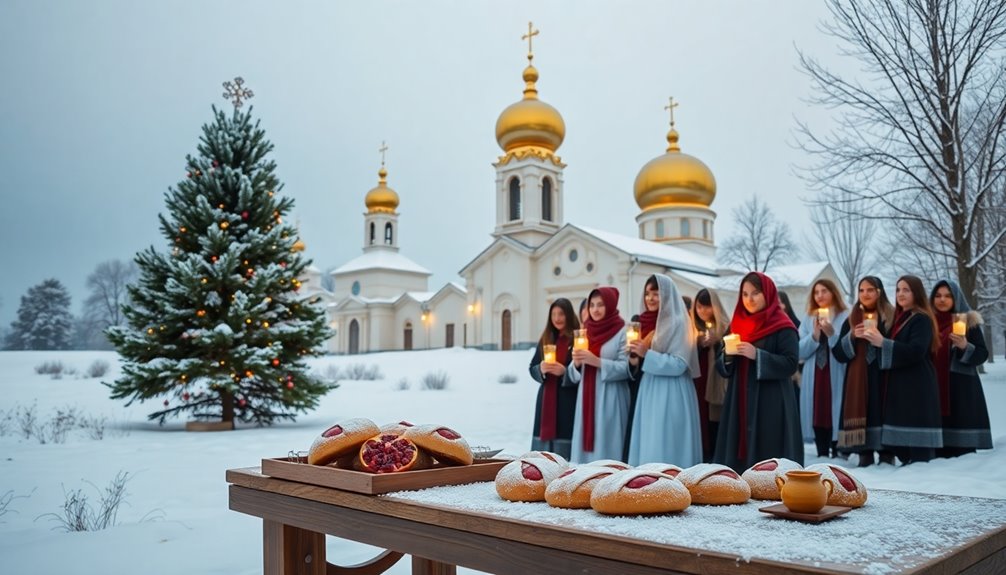
Celebrating Christmas on January 7 holds significant meaning for Orthodox Christians, rooted in their observance of the Julian calendar, which lags 13 days behind the Gregorian calendar. This date reflects a historical divide stemming from Pope Gregory XIII's calendar reform in 1582, which most Christians adopted.
The significance of January 7 is highlighted by:
- A 40-day fasting period leading up to Christmas
- Emphasis on spiritual preparation and reflection
- Preservation of traditional customs and practices
- Theological distinctions between Eastern and Western Christianity
For Orthodox Christians, January 7 isn't just a different date for Christmas celebrations; it represents a commitment to a historical and spiritual legacy, maintaining their unique identity within the broader Christian community.
Contemporary Observances and Issues
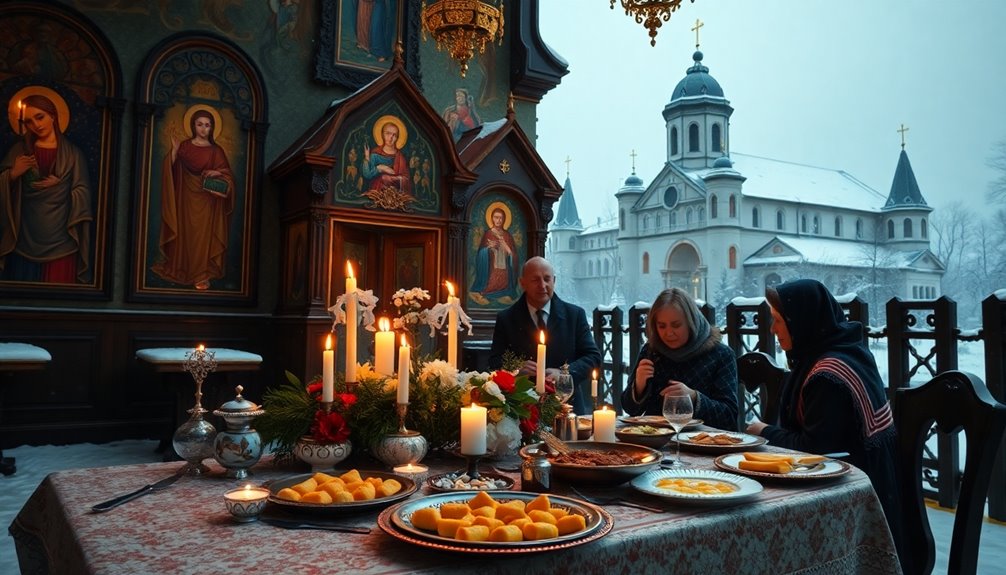
While many Orthodox Christians continue to observe Christmas on January 7, contemporary issues are reshaping these traditions, particularly in Ukraine.
The government has declared December 25 as Christmas for national identity, creating a divide between the new Orthodox Church of Ukraine and the traditional Ukrainian Orthodox Church.
As the Ukrainian Greek Catholic Church adapts to the Gregorian calendar, a shift in Christmas observance is underway.
The ongoing war in Ukraine has intensified discussions about these dates, intertwining cultural identity with religious practices.
This dual celebration on both December 25 and January 7 allows mixed-heritage families to blend traditions.
However, the push for a unified date raises concerns about the preservation of cultural uniqueness and historical continuity amidst these changes.
Frequently Asked Questions
Why Is Orthodox Christmas Different?
Orthodox Christmas is different because it's celebrated on January 7, not December 25.
This discrepancy comes from the use of the Julian calendar, which is currently 13 days behind the Gregorian calendar that most of the world follows.
You'll find that this tradition reflects deep-rooted beliefs and cultural practices within Orthodox Christianity.
While some groups are considering a switch to the Gregorian calendar, the majority continue to uphold the January celebration.
Why Are Orthodox Holidays Different?
When you look at Orthodox holidays, you'll notice they often differ from Western celebrations due to the adherence to the Julian calendar.
This calendar, established long ago, is currently 13 days behind the Gregorian calendar that most people use.
Some Orthodox churches have adopted a revised calendar, but many still stick to the traditional dates, maintaining unique customs and traditions that reflect their rich cultural and religious heritage.
Why Is Serbian Christmas on January 7th?
Serbian Christmas falls on January 7th because the Serbian Orthodox Church follows the Julian calendar, which is 13 days behind the Gregorian calendar used by most of the world.
This tradition dates back to ancient practices and reflects the church's commitment to its historical roots.
On Christmas Eve, you'll experience unique customs like the burning of the Badnjak, symbolizing Christ's birth, and enjoy special meals that foster family unity and spiritual reflection.
What Is the Difference Between Epiphany and Orthodox Christmas?
"Good things come to those who wait," and in Orthodox Christianity, the celebrations extend well beyond Christmas.
While Orthodox Christmas on January 7 commemorates Christ's birth, Epiphany on January 19 marks His baptism in the Jordan River.
You'll notice that Epiphany often feels like a continuation of the Christmas festivities, with unique rituals, like the blessing of water, highlighting the dual significance of Christ's birth and baptism in the faith.
Conclusion
So, while it might seem strange that Orthodox Christians celebrate Christmas on January 7, it's really just a matter of different calendars and traditions. Embracing these unique customs can deepen your understanding of the diverse ways people express their faith. You might think it's too complicated, but exploring these rich traditions can be a rewarding experience, opening up new perspectives on what Christmas truly means across cultures. After all, isn't that what makes the holiday season so special?
